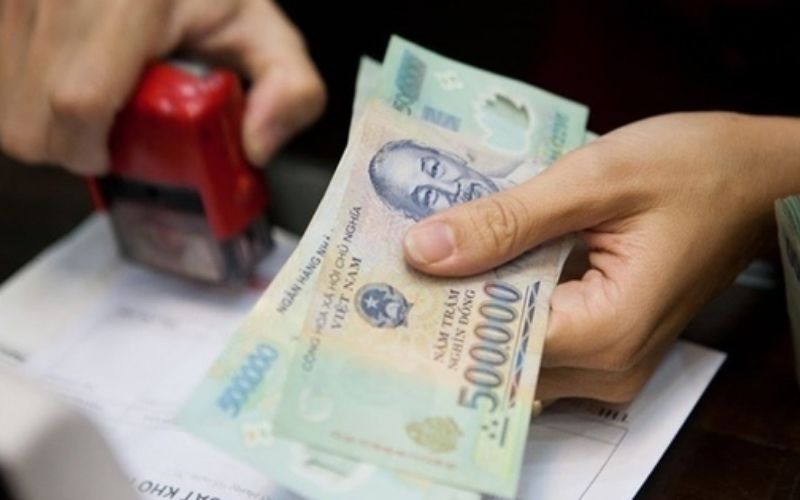Do probation employees receive Tet bonuses at the end of the year?
Legal regulations on Tet bonuses for employees
The Tet bonuses have almost become a workplace tradition when every year-end, during the Tet holiday, employees eagerly anticipate receiving a Tet bonus as a recognition of their labour achievements over the past year. However, many employees do not fully understand the legal regulations governing this system, leading to misconceptions that Tet bonuses are a mandatory obligation of the employer. Additionally, there is a significant concern regarding whether probation employees are entitled to Tet bonuses.
According to Article 104 of the Labour Code 2019, a bonus is an amount of money, property, or other forms that the employer grants to the employee based on the production results, business performance, or the completion of the employee’s work. The employer has the right to decide on the bonus regulations and must publicly announce it at the workplace after consulting the opinions of the employee representative organisation at the grassroots level.
Thus, the decision to provide a bonus or not lies with the employer. In cases where the employer and employees agree on bonuses, the employer must establish a bonus regulation and seek the opinions of the employee representative organisation at the workplace through a dialogue process.[1] To be clear, the employer needs to specify the types of bonuses, the forms of bonuses, the conditions for receiving bonuses, and the applicable bonus rates for all employees or differentiate them based on job levels and positions.
In practice, employers and employees may also agree on bonus types such as performance bonuses, Tet bonuses, and bonus amounts in the employment contract or collective labour agreement. Some criteria for bonus eligibility include the company’s profitable business results for the year, the employee’s job completion level, and the number of months worked.
In the business context, Tet bonuses play a motivational role in encouraging employees to strive and innovate during their work, thereby contributing to increased productivity and labour efficiency. In the labour market, Tet bonuses are one of the criteria that employees consider when evaluating companies with recruitment needs. Many companies focus on establishing bonus regulations and applying various bonus types and rates to gain a competitive advantage, retain employees, and attract high-quality labour.
Furthermore, considering the specific situation and conditions of the enterprise, decisions regarding the bonus system can be adjusted to meet the goals and strategies of the company at each stage. This not only creates favourable conditions for flexible development in the work environment but also enhances employee satisfaction and commitment.

Can Probationary Employees Receive Tet Bonuses?
As mentioned earlier, the employer has full discretion to decide on Tet bonuses as well as the bonus amount for employees. If the parties do not agree on bonuses in the specified documents, the employer is not obligated to provide Tet bonuses to probationary employees.
Tet bonuses are typically motivational and an expression of gratitude from the company to employees who have contributed value to the company’s production and business activities. These bonuses are evaluated based on the employee’s job performance. Additionally, many companies also provide Tet bonuses based on the number of months worked. However, during the probation period, employees usually do not have a stable and extended duration[2] to make significant contributions to the company’s production and business results. Moreover, probation employees often have limited opportunities to showcase their abilities and contribute to the company’s development. Consequently, employers may choose not to apply Tet bonuses policies to probation employees or restrict the recruitment of new employees at the year-end.
In practice, some companies negotiate with probation employees regarding salary and benefits upon successful completion of the probation period and becoming regular employees. Employers and probation employees can agree on the terms of the probation period in the employment contract[3], specifying the bonuses and bonus amounts applicable to employees working for the company. In this manner, probation employees are able to comprehend the company’s welfare regulations and select a workspace that best fits their requirements and preferences.
Tet bonuses are considered additional support that employers provide to eligible employees, recognising their labour achievements and contributions to the company’s development. To avoid misunderstandings or unnecessary conflicts, employers should clearly define and standardise Tet bonuses policies in human resources documents, specifying the eligible recipients, criteria, conditions, and bonus amounts. From the employees’ perspective, Tet bonuses should be viewed as a positive indicator that the company is operating steadily and effectively, rather than an obligatory duty of the employer. The form of Tet bonuses can include not only monetary rewards but also gift options, depending on the employer’s decision.

Does the Probation Period Count as Working Time for Tet Bonuses?
Employees on probation are individuals working for the employer under an agreement, receiving wages, and being under the management, operation, and supervision of the employer but are not yet considered official employees. During the probation period, employees work under a probation contract. Additionally, the probation period is agreed upon by both parties based on the nature and complexity of the work, but it is only conducted once for a specific job, ensuring conditions as specified in Article 25 of the Labour Code. The purpose of the probation period is for the employer and the employee to understand factors such as goals, development direction, and the corporate culture, as well as the employee’s level of integration. The employer evaluates the probation employee’s performance and decides whether to officially hire them.
Working time is the duration during which the employee must fulfil their labour obligations in the employment relationship based on legal regulations, labour contracts, or collective labour agreements. Whether the probation period is counted as working time for Tet bonus eligibility is addressed in certain related provisions.
Accordingly, the probation period is still considered as working time to calculate the annual leave days for employees if they continue to work for the employer after the probation period.[4] Additionally, the probation period is confirmed as working time to calculate severance pay, job loss allowance. Specifically, the working time to calculate severance pay, job loss allowance is the total time that the employee has actually worked for the employer, minus the time the employee participated in unemployment insurance as regulated by the law on unemployment insurance and the time for which the employer has paid severance pay, job loss allowance.[5] It can be seen that many current labour laws have determined that the probation period is counted as working time because during the probation period, the probationer performs all the duties of an official employee of the company, receives a salary, and enjoys legitimate rights and benefits, contributing to creating value for the company.
As discussed above, bonuses are not an obligatory duty of the employer according to legal regulations. The law also does not have specific provisions on how long an employee must work to be eligible for Tet bonuses. Therefore, the decision of the employer regarding the duration of employment required to receive Tet bonuseswill depend on the actual situation of the company, as well as the documents, regulations, internal rules, employment contracts, or collective labour agreements.
In practice, many companies will include the probation period in the working time to ensure the rights of employees and also provide Tet bonuses to those employees who meet the required working time. This is reasonable to acknowledge the contributions of employees who continue to work for the employer after the probation period, contributing to harmonizing the relationship between both parties.

Above is an overview of Tet Bonuses for probation employees that Phuoc & Partners shares with readers. If you have any difficulties related to the legal field, please contact us. Phuoc & Partners is a professional consulting firm established in Vietnam and currently has nearly 100 members working in three offices in Ho Chi Minh City, Hanoi and Danang. Phuoc & Partners is also rated as one of the leading consulting firms specializing in business law in Vietnamthat has leading practice areas in the legal market such as Labour and Employment, Taxation, Merger and acquisition, Litigation. We are confident in providing customers with optimal and effective service.
[1] Article 41.1 Decree 145/2020/ND-CP.
[4] Article 65.2 Decree 145/2020/ND-CP
[5] Article 8.3 (a) Decree 145/2020/NĐ-CP








